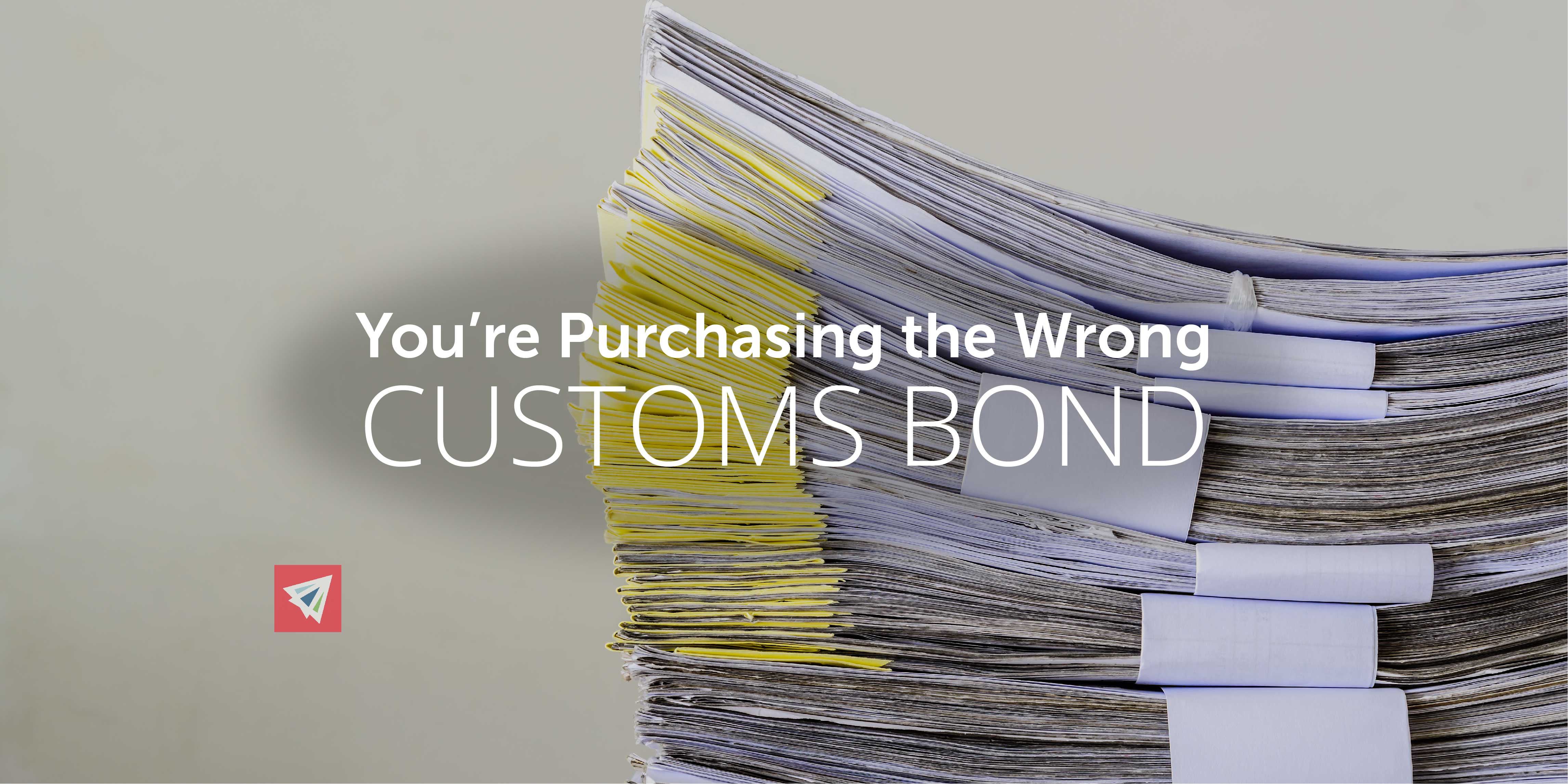Customs here, customs there, documents everywhere. If you’re an importer, you’re probably humming that fancy rhyme to yourself every day. With more documents than what anyone is physically capable of tracking and intimately understanding, companies all over the U.S. are signing into bad deals without the time to validate their decisions. Customs bond selection is no exception.
Purchasing a Customs Bond: Which to Select
Customs bonds are required for any company that is importing more than $2,500 of cargo in commercial value. When it comes to customs bonds, you essentially have two options: single-transaction customs bonds (also single-entry customs bonds) or continuous customs bonds (also known as annual customs bonds). Here’s a little bit about each type:
Single-Transaction Customs Bonds
Single-entry or single-transaction customs bonds (SCB) are customs bonds that must be purchased for each individual shipment.
Keep in mind there is a difference between a “shipment” and a “container”. One shipment may contain multiple containers. A shipment is defined by what is listed on a Master Bill Of Lading. Since a Master Bill Of Lading may list more than one container for the particular “shipment” at hand, a single-transaction bond can cover multiple shipments. If you ship multiple containers around the same time of year but have an annual bond, you may be purchasing the wrong customs bond. Your overall volume and timing should contribute to your decision criteria when purchasing a customs bond.
Continuous Bonds
A continuous, or annual bond, is a customs bond that is valid for an entire year after its date of purchase. Bonds of this type only need be purchased once per year per shipper. Keep in mind that not renewing your bond can cause delays or fines so make sure you know the renewal process! These are optimal for companies who ship multiple times throughout the year, as there is no need to purchase any additional bonds for the annual bond’s validity period.
Another major benefit to having a continuous bond is that you won’t have to purchase a separate bond for your Importer Security Filing (ISF). All ISF information must be submitted to the CBP at least 24 hours before your goods hit the port in the U.S. This means that with a continuous or annual customs bond, the CBP will have more time to review your cargo for safety and potential security risks.
How Much Do Customs Bonds Cost?
The pricing of customs bonds will vary with shipment volume. You’ll have to talk over the specific details with your carrier to be approved for the correct type of bond and right pricing, but for the most part, bond pricing follows this structure:
Single-Transaction Customs Bond Price
Single-transaction customs bond pricing changes per the value of your goods. This is why picking the right customs bond not only depends on shipment volume, but shipment value as well.
As a general rule of thumb, most single-transaction customs bonds will be priced between 0.5% to 2% of the commercial value of your goods. However, keep in mind that this number will fluctuate depending on a wide-variety of factors. Factors such as liability, risk of transport, type of goods (hazardous or non-hazardous), country of origin, and many others can all contribute to higher or lower-than-average pricing structures for single-transaction customs bonds.
Keep in mind that there are “maximums” for the price of single-transaction customs bonds. Once again, pricing will vary by company, but for very large projects, customs will often dictate that a company must be legally registered as a business with an annual bond. If you are shipping very expensive or expansive projects and plan on using a single-entry bond, make sure to discuss with your carrier whether or not it will be legally feasible. Otherwise, you will need to purchase an annual bond…
Annual Customs Bond Price
Annual customs bonds, unlike single-transaction bonds, are charged as a one-time flat rate fee and are valid for the following 12 months after the date-of-purchase.
Annual customs bond prices will vary depending on a few factors as mentioned below. They can start as low as $500 and go up from there depending on, once again, the liability, risk, goods, hazardous characteristics, and many other factors.
While bond prices may vary depending on the shipment, you can most likely assume that the price of either bond will increase correspondently with the other. In other words, if the above stated factors for your shipment details increase the price of your annual bond, you can almost guarantee the price of a single-transaction bond will also be above the benchmark. What does this mean? There’s no “cutting corners” when it comes to purchasing a customs bond. Your decision between the two should be based upon your frequency of importing and future project plans.
Conclusion
You don’t have too many options when it comes to purchasing a customs bond. At the end of the day, you’ll be making a decision between a single-transaction customs bond or an annual customs bond (also referred to as continuous customs bond). Finding the ideal bond will largely depend on your frequency of imports. The costs associated with single-entry bonds stack up quickly for frequent shippers, and thus companies who ship a lot should avoid purchasing single-transaction customs bonds. These businesses would find it more cost-effective to purchase an annual customs bond, or continuous customs bond, which would be valid for all shipments over the next 12 months following the date of purchase.
Customs bond prices may vary depending on the commercial value of the cargo, risk, liability, and a variety of other factors. If you are curious as to how you might be able to start saving on your customs bonds, give us a call and we would be happy to help you out!

4 thoughts on “You’re Purchasing the Wrong Customs Bond”